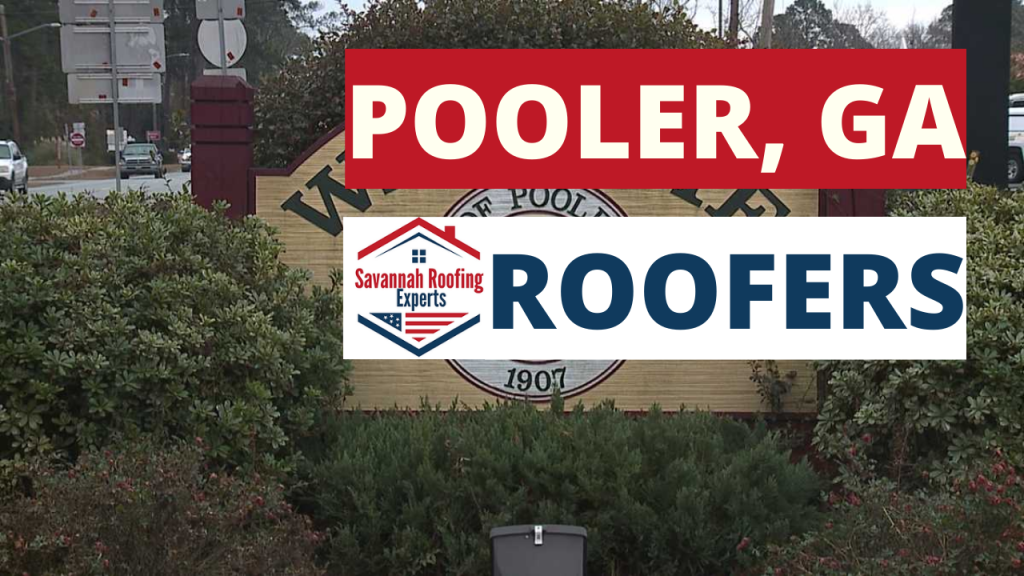What should you look for to find a licensed roofing contractor in Pooler, GA?
Or what about this question: What’s more dangerous—signing a contract for a new roof without reading it, or letting a stranger work on your roof shingles after a storm that is from out of town? After the recent surge in fly-by-night contractors flooding Pooler, GA, neighborhoods, the answer is obvious.
A licensed roofing company can protect your investment, whether you need roof inspection services for a flat roof or full roof replacement services after severe weather. But only if you ask the right questions before the ink dries. Keep reading to discover the seven questions that will safeguard your home, your budget, and your peace of mind.
For homeowners in Pooler seeking reliable and professional roofing services, partnering with a company like Roofing Experts of Savannah ensures you’re working with experienced professionals who understand local needs and building codes.
Quick Licensed Roofer Pooler Takeaways:
- Verify State Licensing – Ensure the roofer holds a Georgia-issued license, confirming they’ve met all education, testing, and compliance requirements.
- Require Insurance Proof – Look for general liability (property damage coverage) and workers’ compensation (injury protection) to safeguard your finances.
- Check Local References – Ask for recent Pooler-area projects and speak with past clients to verify workmanship, code compliance, and reliability.
- Understand Warranty Coverage – Compare contractor workmanship warranties with manufacturer material warranties, and confirm terms in writing.
- Confirm Permit Handling – A reputable roofer should manage the entire permitting process to ensure compliance with Pooler building codes.
- Get a Detailed Written Contract – Make sure it includes scope of work, payment terms, timelines, warranties, and dispute resolution procedures.
- Review Estimates Carefully – Request itemized costs for materials, labor, permits, and cleanup to avoid surprise charges.
Best question to ask: Are you a Licensed and Insured Roofing Contractor in Pooler, GA?
A licensed and insured roofing contractor meets Georgia’s regulatory standards, minimizes liability, and guarantees workmanship quality. Licensing confirms that the roofer has passed state exams and complies with Pooler building codes, while insurance protects you from property damage or worker injuries. For a secure roof repair Pooler GA project, always demand proof of both credentials before signing a contract.
Why Is Licensing Important for Pooler Roofing Contractors?
Licensing for roofing contractors ensures they meet specific educational, training, and bonding requirements set by the state. This process helps guarantee adherence to building codes, safety regulations, and ethical business practices, providing homeowners with legal recourse if the work doesn’t meet standards.
In short, for Pooler homeowners, working with a licensed roofing contractor means:
- Compliance with Building Codes – Ensures your roof meets Georgia’s construction and safety requirements.
- Verified Skills and Knowledge – Confirms the contractor has passed state exams and received proper training.
- Protection Through Bonding – Provides financial coverage if the contractor fails to complete the job correctly.
- Legal Recourse – Gives homeowners a path to address substandard work or disputes.
- Commitment to Ethical Practices – Shows the contractor operates under regulations designed to protect consumers.
The Georgia State Licensing Board for Residential and General Contractors sets these requirements to safeguard both property owners and the integrity of the roofing industry. Verifying a license before hiring isn’t just a good practice—it’s one of the most effective ways to ensure your project is completed safely, legally, and to a high standard.
How Can Homeowners Verify a Roofing License in Georgia?
To confirm a roofing license in Pooler or Georgia, follow these verification steps:
- Visit the Georgia Secretary of State Professional Licensing Division website.
- Search by contractor name or license number in the ‘Licensee Search’ portal.
- Review the license status, expiration date, and any disciplinary actions.
- Call the Georgia Board of Residential and General Contractors for confirmation.
These steps build trust and establish a clear record, preparing you to assess the insurer’s coverage next.
What Types of Insurance Should a Licensed Roofer Carry?
Licensed roofers in Pooler should maintain both general liability and workers’ compensation policies to protect homeowners and crews. General liability covers third-party property damage, while workers’ compensation handles injury claims. A roofer who carries comprehensive insurance demonstrates financial stability and responsibility.
| Insurance Type | Coverage Attribute | Typical Value |
|---|---|---|
| General Liability | Property & Third-Party | Up to $1 million per occurrence |
| Workers’ Compensation | Medical & Wage Claims | Statutory limits per employee |
| Commercial Auto | Vehicle & Equipment | $500,000 combined single limit |
This insurance framework complements verified licensing and sets the stage for evaluating a contractor’s reputation. Ensuring your contractor is fully insured is a critical step in protecting your home and finances.
Can You Provide Local References and Examples of Your Roofing Work in Pooler?

Local references reveal real-world performance on Pooler roofs, climate resilience, and customer satisfaction. Requesting past project details demonstrates the contractor’s transparency and accountability. Seeing completed jobs in your neighborhood offers insight into workmanship quality and material choices. A reputable company like Roofing Experts of Savannah will readily provide references and showcase their portfolio.
Benefits of Local References for Pooler Homeowners
A contractor’s promises mean little without proof, and local references are one of the most reliable ways to verify their track record. Speaking directly with past clients in your community gives you insight into how the roofer performs under real conditions, not just on paper.
When you check local references, you can:
- Evaluate Workmanship Quality – See firsthand how well the roof has held up over time.
- Confirm Code Compliance – Ensure the contractor understands and follows local building codes.
- Gauge Experience with Local Conditions – Learn how they address challenges like severe storms, high humidity, or seasonal wear.
- Assess Customer Service – Find out if the contractor communicates clearly, respects timelines, and handles issues professionally.
- Verify Reliability – Confirm they deliver on promises and complete projects as agreed.
Local references also show you the contractor’s reputation in your area, helping you choose someone trusted by your neighbors and familiar with the unique needs of homes in your community.
How to Check Roofing Contractor References Effectively
To evaluate references from Pooler roofing projects, follow these tips:
- Contact recent clients to inquire about project scope, budget adherence, and communication.
- Visit completed roofs in person to inspect material installation and flashing details.
- Review online aggregate ratings for consistent feedback trends.
- Ask for photos of before-and-after repairs to assess overall craftsmanship.
These verification tactics ensure you choose a roofer whose track record aligns with your expectations and terminology introduced earlier.
What Warranty Policies Do You Offer for Workmanship and Roofing Materials?

Warranty policies protect your investment by defining coverage scope and duration for both labor and materials. A robust workmanship warranty covers installation defects, while manufacturer warranties address material performance. Clarifying these terms upfront prevents surprises and preserves long-term value. Understanding the warranty is crucial, and a company like Roofing Experts of Savannah will clearly outline these protections.
What Is the Difference Between Manufacturer and Contractor Warranties?
| Entity | Warranty Type | Coverage Duration | Coverage Scope | Why Essential |
|---|---|---|---|---|
| Manufacturer | Material Warranty | 20–50 years | Shingle defects and fading | Ensures material durability |
| Contractor | Workmanship Warranty | 1–10 years | Installation errors and leaks | Guarantees proper application and repair |
Understanding this distinction helps you negotiate comprehensive coverage, leading into material-specific evaluation.
How to Evaluate Warranty Terms for Different Roofing Materials
When comparing warranty clauses, consider these criteria:
- Confirm which defects are covered under each warranty category.
- Check whether prorated coverage reduces over time.
- Verify transferability if you sell your home.
- Review maintenance requirements to avoid voiding the warranty.
These checks provide clarity on long-term protection and facilitate a smooth transition into permit management.
How Do You Handle Permits and Comply with Pooler Building Codes?
Proper permit handling ensures legal compliance and safeguards your home against unapproved alterations. Building permits in Pooler verify that roof repairs and replacements meet established safety and structural requirements. A contractor’s permit expertise prevents fines and inspection delays. Reputable contractors, such as Roofing Experts of Savannah, manage the entire permitting process seamlessly.
Why Are Building Permits Required for Roof Repairs and Replacements in Pooler?
Hiring a roofer without proper licensing or insurance is like handing your house keys to a stranger and hoping for the best. It’s a risk that can leave you paying for damage, injuries, or subpar work long after the contractor is gone. A licensed and insured roofing contractor not only meets Georgia’s regulatory standards but also protects your home, your finances, and your peace of mind.
Licensing shows the contractor has passed state exams, understands Pooler building codes, and follows industry best practices. Insurance shields you from unexpected costs if a worker gets injured on your property or if accidental damage occurs during the job. Without these credentials, even a minor roof repair in Pooler GA could spiral into a major legal and financial headache.
Here’s what to look for before hiring:
- State-Issued License – Confirms the roofer has met all testing, education, and compliance requirements.
- General Liability Insurance – Covers property damage caused during the project.
- Workers’ Compensation Coverage – Protects you from medical or legal costs if a worker is injured.
- Familiarity with Local Codes – Ensures your project meets Pooler’s specific building and safety regulations.
- Proof on Paper – Always request and verify documentation before work begins.
What Is the Contractor’s Role in Obtaining Permits?
Permits might feel like nothing more than red tape designed to slow you down, but skipping them can cost you far more than the paperwork ever will. Without proper permitting, you risk fines, failed inspections, or even having to redo completed work—all on your dime. That’s why a qualified roofing contractor takes this responsibility seriously.
A full-service contractor acts as your guide through the permit process, making sure every step is handled correctly and on time:
- Prepare and Submit Applications – File all required paperwork with accurate roof plans and project details.
- Coordinate Inspections – Schedule and manage inspections at critical points to avoid delays.
- Address Code Violations – Resolve any compliance issues quickly and resubmit updated documents.
- Secure Final Approval – Obtain official sign-off so your project is closed out wholly and legally.
When your contractor manages permits from start to finish, it keeps your project aligned with local building codes, ensures work stays on schedule, and protects your investment from costly setbacks.
What Is Your Process for Estimates, Contracts, and Project Timelines?
Homeowners deserve clarity before a single shingle is removed or replaced. A well-structured process for estimates, contracts, and timelines protects both your budget and your peace of mind. It starts with a thorough roof inspection, followed by a detailed written estimate that outlines costs, materials, and labor.
From there, a formal contract locks in the scope of work, payment terms, and procedures for handling any changes. Finally, a realistic project timeline ensures you know exactly when each stage will be completed. Clear communication regarding these aspects is a hallmark of professional roofing companies like Roofing Experts of Savannah.
Here’s an example of how a typical roofing project might look:
| Project Phase | Description | Estimated Duration |
|---|---|---|
| Initial Inspection & Estimate | On-site evaluation, measurements, and written proposal | 1–2 days |
| Contract Signing | Agreement on scope, materials, and payment terms | 1 day |
| Material Ordering | Purchase and delivery of selected roofing materials | 3–5 days |
| Project Start | Removal of old roofing, prep work for installation | 1–2 days |
| Roof Installation | Installation of new roofing system | 2–6 days |
| Final Inspection & Clean-Up | Quality check, debris removal, and homeowner walkthrough | 1 day |
What Key Clauses Should Homeowners Look for in a Roofing Contract?
When reviewing a roofing contract, check for:
- Detailed scope of work and materials list.
- Payment schedule tied to project milestones.
- Warranty and insurance terms clearly stated.
- Dispute resolution and change-order procedures.
A comprehensive contract framework reinforces accountability and leads to an estimate presentation.
How Are Estimates Prepared and Presented for Pooler Roofing Projects?
Estimates for Pooler roof services typically include:
- Itemized material and labor costs.
- Permit and disposal fee breakdowns.
- Optional upgrade or storm-damage repair allowances.
- Expiration date to lock in pricing.
This level of detail preserves trust and guides the subsequent discussion on timelines.
What Are Typical Project Timelines and Cleanup Standards?
A well-managed roof replacement in Pooler follows a structured schedule:
- Site preparation and safety setup: 1 day
- Tear-off and deck inspection: 1–2 days
- Shingle installation and flashing: 2–3 days
- Final inspection and cleanup: 1 day
Contractors should remove debris daily, protect landscaping, and perform a magnet sweep before completion. Roofing contracts that integrate these timeline and cleanup standards ensure a smooth project from permit acquisition through final inspection.
A thorough vetting process—covering licensing, insurance, references, warranties, permits, estimates, and cleanup—equips you to choose a licensed roofing company Pooler homeowners trust. By asking these seven essential questions, you safeguard your investment and secure lasting peace of mind. Take the next step by requesting detailed estimates and confirming credentials before signing any agreement.
Ready for a Reliable Roof?
Don’t leave your home’s protection to chance. Contact the experts who prioritize quality, transparency, and your peace of mind.
Rushing to hire the first contractor who hands you a quote might seem convenient, but it’s the fastest way to invite costly surprises. The right roofing partner will take the time to inspect thoroughly, explain clearly, and deliver exactly what’s promised.
If you want your next roofing project to be smooth, transparent, and built to last, contact Savannah Roofing Experts today and let’s get it done right from the start.



Comments are closed